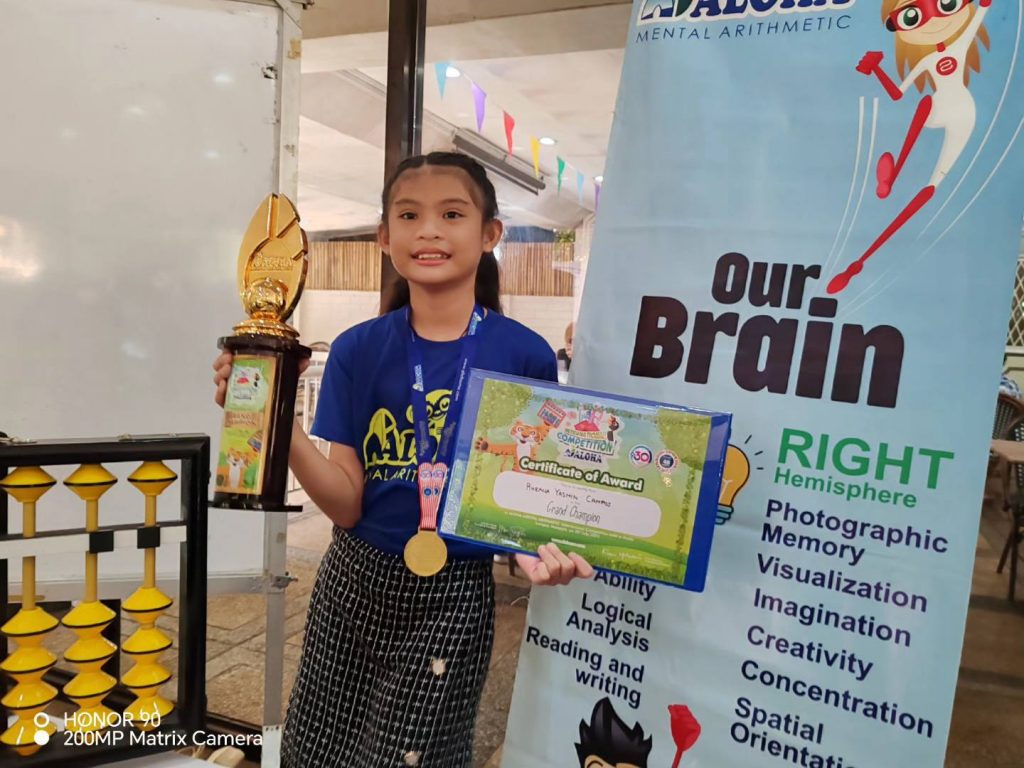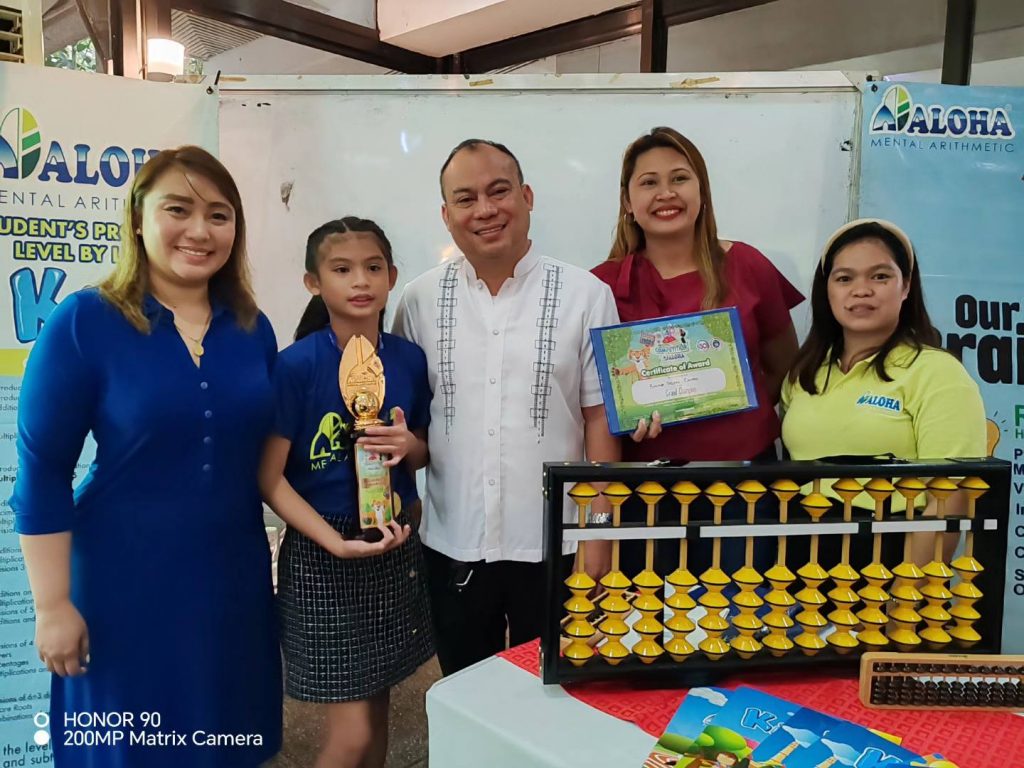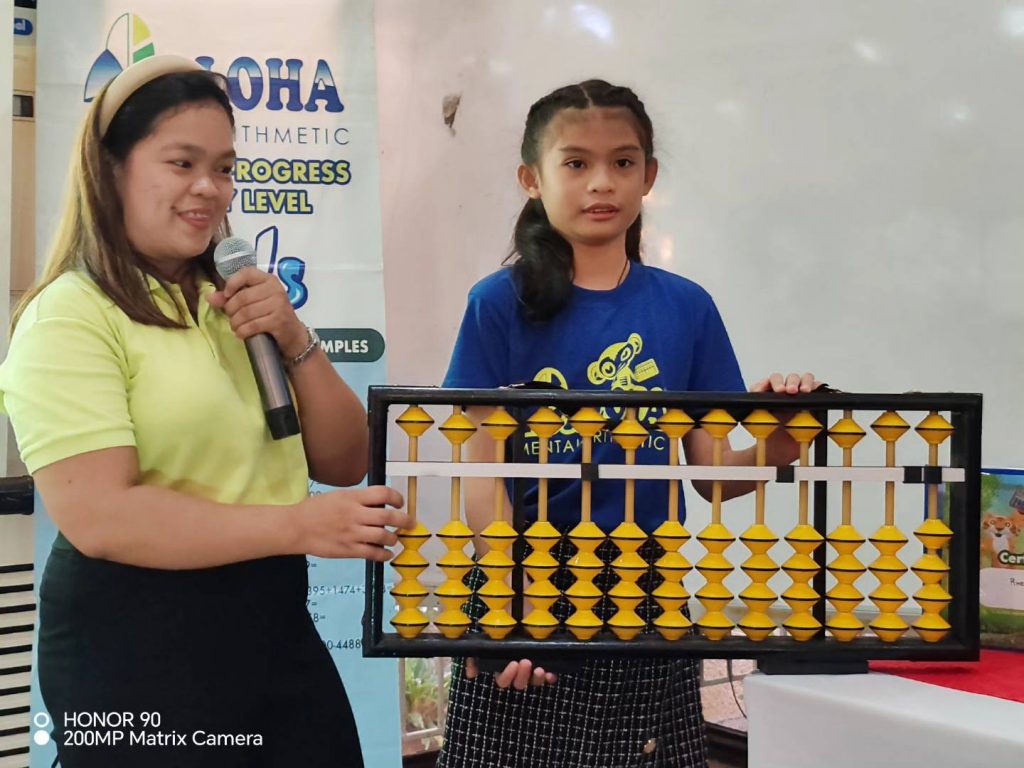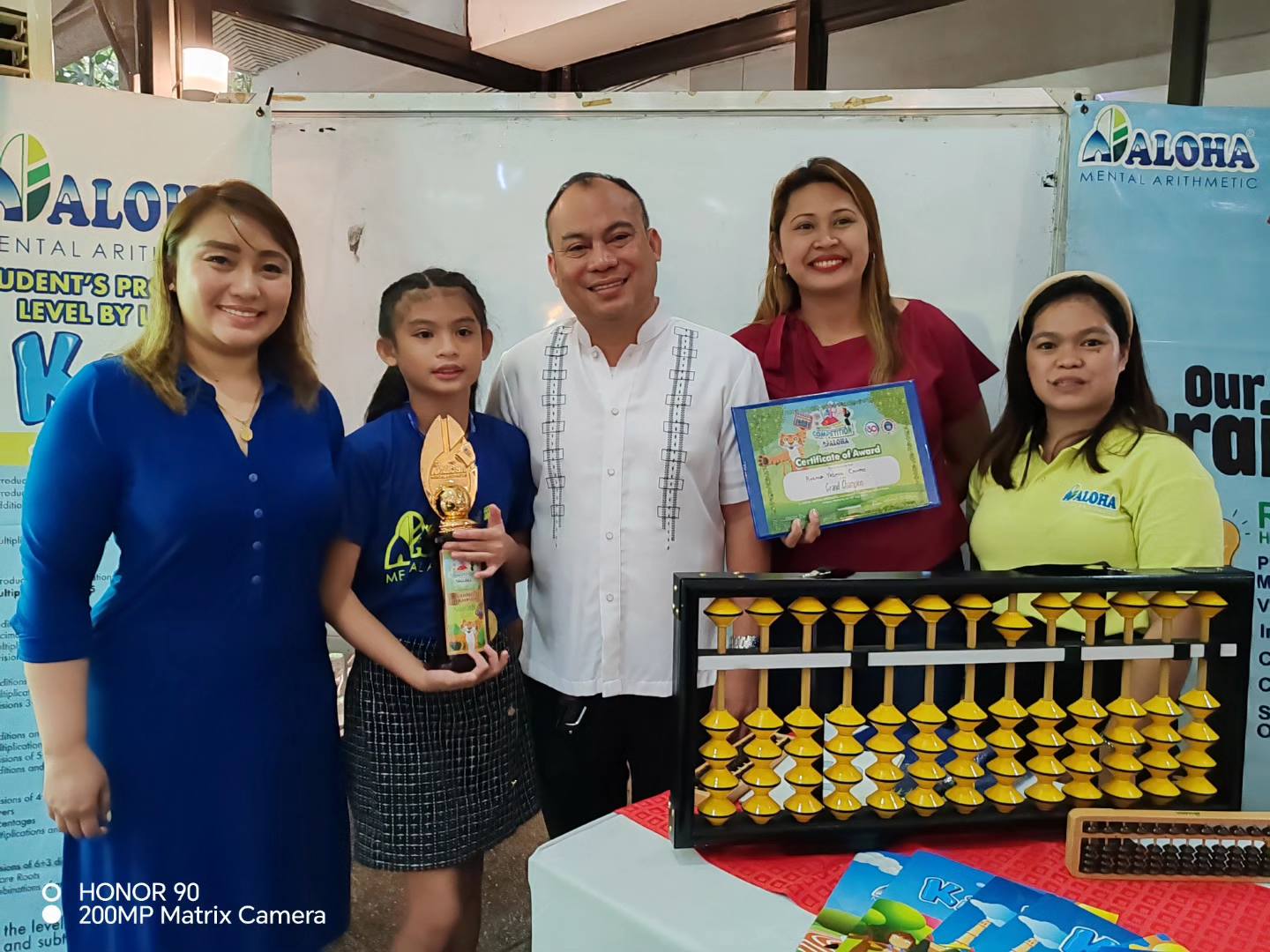10-year-old child prodigy RHEANA YASMIN CAMPOS from Caloocan City is one of the grand champions of the ALOHA Mental Arithmetic International Competition held last July 30 at the Sunway Pyramid Convention Center in Kuala Lumpur, Malaysia.

Together with 11-year-old Darylyn Faith Fabilane from Rizal, the Philippine team bagged the prestigious Grand Champions title of the annual competition against over 700 other competitors coming from Bangladesh, Croatia, China, Canada, Cambodia, Ecuador, India, Indonesia, Mexico, Panama, Taiwan, Uzbekistan, Malaysia, and Venezuela. Also, Philippine Team’s Jake Conner Yao (9) from San Juan City was crowned champion while Ryan Warren Merdegia (9) of Pampanga, brought home the second runner-up title.
The 2023 ALOHA Mental Arithmetic Grand Champion was presented to the media via a round table conference held last Tuesday (August 8) at The Patio of University Hotel in Diliman, Quezon City. Rheana assisted by her teachers at ALOHA Mental Arithmetic Philippines gave a demonstration her high speed mental math skills with the use of the following methods: Abacus-aided computations, mental computations and flash cards.
“The recent competition shows that young Filipinos can unlock their full potential and make a significant impact in the global arena as long as they are given adequate support back home.”
IVY SATO, CEO of ALOHA Mental Arithmetic Philippines
ALOHA MENTAL ARITHMETIC
ALOHA Mental Arithmetic is a brain development program designed to enhance children’s mental arithmetic skills using an abacus-based method. It focuses on improving various cognitive skills, including concentration, memory, creativity, and problem-solving abilities. The program often involves teaching children to perform arithmetic calculations using an abacus or mentally, which can lead to improved mathematical abilities.
ALOHA, which stands for Abacus Learning of Higher Arithmetic, was founded in 1993 by Mr. Loh Mun Sung, who specifically designed a mental math program for children ages 4 to 13 based on the Abacus Computational methods from China and Taiwan. The program was initially introduced in Malaysia and gained popularity, leading to its expansion to other countries.
ALOHA Mental Arithmetic goes beyond mathematical skills and targets a child’s IQ and EQ (emotional intelligence). The program aims to assist children in completing their homework more efficiently, developing exceptional mental calculation skills, improving problem-solving abilities, enhancing their capacity to remember information and visualizing conceptual maps in their minds. By engaging in ALOHA, children can strengthen their cognitive abilities and build confidence in their math skills, ultimately alleviating Math Anxiety

PROGRAMS
ALOHA provides scientifically proven and effective programs tailored for primary and middle-school students. The organization offers three distinct programs, each catering to a specific age group. The first program, Kinder Tiny Tots, is designed for children aged 4-5 years old and consists of two levels. The second program, Tiny Tots, is for children aged 5-7 years old and encompasses ten levels. Lastly, the Kids program is intended for students aged 8-13 years old and comprises eight levels.
Kinder Tiny Tots (Preparatory to Kinder)
The Kinder Tiny Tots itinerary is a program designed for children ages 4-5 years old with the purpose of cultivating the eight intelligences proposed by Howard Gardner, an American psychologist. These intelligences include musical, intrapersonal, visual-spatial, naturalistic, bodily-kinesthetic, logical-mathematical, interpersonal, and linguistic-verbal intelligences.
Tiny Tots (Kinder to Grade 2)
The Tiny Tots itinerary is a program designed for children aged 5-7 years old. This comprehensive program comprises a range of activities aimed at enhancing the student’s mental processing speed. The primary objective is to establish a solid mathematical foundation, fostering continuous stimulation of both brain hemispheres and promoting overall brain exercise.
Kids Grade 3 to Grade 7)
The Kids itinerary is a program for children 8-13 years old. This program exhibits a number of advanced mathematical equations with multiple digits. The objective is to bring speed and precision to students and ensure that they are capable of doing mental calculations without the use of any external aids.
WHY ABACUS?
An abacus is a traditional counting and calculating tool that has been used for centuries to perform arithmetic operations. It consists of a rectangular frame with a series of rods or wires, each holding a set of beads that can be moved back and forth. The beads on the abacus are used to represent numerical values, allowing for efficient calculations without the need for pen and paper or electronic devices.

The abacus is usually divided into different columns, with each column representing a different place value (ones, tens, hundreds, etc.). The beads on each column can be manipulated to represent numbers and perform addition, subtraction, multiplication, and division.
Abacuses come in various forms and designs, including the traditional soroban in Japan, the suanpan in China, and other variations from different cultures around the world. They were widely used before the advent of modern calculators and computers and are still used in some educational settings to teach mental arithmetic skills and develop numerical fluency.
In recent years, the abacus has also been integrated into educational programs like the ALOHA Mental Arithmetic program to help children enhance their mental calculation abilities and develop cognitive skills.
Using an abacus can offer a range of cognitive, mathematical, and educational benefits, particularly for young learners. Here are some of the key advantages:
- Enhances Mental Calculation Skills: Manipulating the beads on an abacus requires mental effort and helps improve mental arithmetic abilities. Practicing with an abacus can lead to better number sense, quicker mental calculations, and improved problem-solving skills.
- Develops Spatial Awareness: Working with an abacus involves understanding and visualizing numbers in different columns and positions. This enhances spatial awareness, an important skill in mathematics and other areas.
- Boosts Concentration and Focus: Performing calculations on an abacus demands concentration and focus. Regular practice can help improve a child’s ability to concentrate for longer periods of time.
- Builds Confidence: As children master the abacus techniques and improve their mental calculation speed, they gain confidence in their mathematical abilities.
- Encourages Analytical Thinking: Using an abacus requires breaking down complex calculations into smaller steps, promoting logical and analytical thinking.
- Strengthens Memory: Remembering sequences of calculations and numbers on the abacus helps exercise and enhance memory skills.
- Promotes Fine Motor Skills: Moving beads on an abacus involves fine motor skills and hand-eye coordination. This can be particularly beneficial for young children’s physical development.
- Foundation for Mathematical Concepts: Manipulating the abacus can help children grasp fundamental mathematical concepts like place value, addition, subtraction, multiplication, and division in a tangible and visual manner.
- Cultural and Historical Appreciation: Learning to use an abacus can provide insights into the history and cultural significance of ancient calculating tools, fostering an appreciation for different mathematical traditions.
- Alternative Learning Method: For some children, learning with an abacus can be an engaging and alternative way to understand mathematical concepts, especially if they struggle with traditional teaching methods.
- Preparation for Advanced Math: Developing strong mental math skills through abacus practice can lay a solid foundation for more advanced mathematical concepts in the future.
- Confidence in Problem Solving: As students become more adept at mental calculations, they gain confidence in tackling everyday math problems, both in and out of the classroom.
For more about ALOHA Mental Arithmetic Philippines, visit their website at www.alohaphilippines.com
- Taiwan at the Forefront of Green Economy - July 26, 2024
- Discover Tohoku in the Summer - July 25, 2024
- Back-to-School Tips: How to Make the Most of What You Already Have - July 25, 2024








